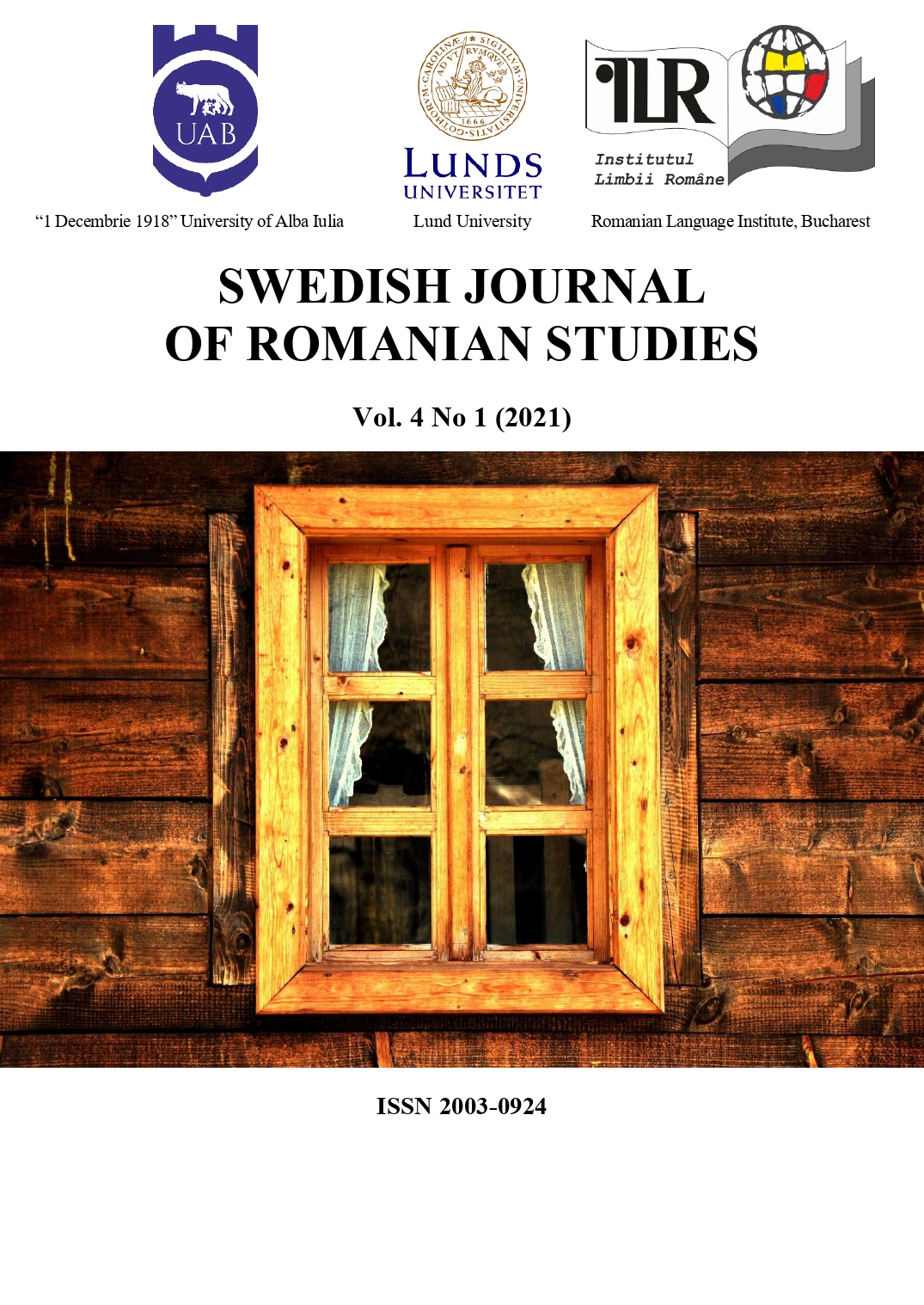„Nu e cazul să ne dăm ceea ce nu suntem”. Spre o înţelegere a comunismului prin Bandiţii de Vasile Ernu
“It’s not the case to pretend to be something we are not”. Towards an understanding of communism through The Bandits by Vasile Ernu
DOI:
https://doi.org/10.35824/sjrs.v4i1.22421Keywords:
marginality, communism, identity, ambivalence, Vasile ErnuAbstract
“The Bandits”, Vasile Ernu’s second volume of his trilogy, the trilogy of marginal men, describes the world of thieves, of bandits, of criminality in a communist society, without the narrator ever becoming one of them. He is more of an adopted son, someone who has almost unmediated access to this world without suffering the repercussions of revealing that world’s secrets. This should not to be understood that he has total access to the bandits’ secrets, but that he is not viewed as a threat, even if he reveals more of this world than others. The narrator is accepted because he does his best to be himself and this is a value of utmost importance for this marginal group of people, others knowing and owning their identity, the type of narrative they tell about themselves. On the other hand, the narrator is himself a marginal man as well, considering the fact that he grew up among religious people who were quite fundamentalists in their way of expressing this belief (but not in the way in which we picture today religious fundamentalism: bombing, Muslims, terror). Thus, this essay is meant as a study of one’s sense of identity when having to juggle with more identities, when having to evade (or even be subversive towards) the more pervasive, totalitarian regime in which these marginal men find themselves.
References
Becker, H.S. (1997). Outsiders. Studies in the Sociology of Deviance. New York: The Free Press.
Borin, P. (2017). „De la Sectă la Bandă: «În comunism cetățeanul trebuia să lupte cu despotismul Statului-partid, în capitalism trebuie să luptăm cu despotismul Capitalului»”/ “From a Sect towards a Gang: ‘In Communism the Citizen Had to Fight the State-Party’s Despotism, in Capitalism We Have to Fight the Capital’s Despotism” [interviu cu Vasile Ernu realizat de Pavel Borin în colaborare indirectă cu Bogdan Rusu], http://www.platzforma.md/arhive/37126, accesat la data de 16 martie 2021.
Coșa, B. (2020). „Capitalismul distruge creștinismul într-un hal în care comuniștii nici n-au îndrăznit să viseze”/ “Capitalism destroys Christianity in a way in which communists never dreamt it possible” [Vasile Ernu în dialog cu Bogdan Coșa], https://blog.goethe.de/dlite/archives/812-Capitalismul-distruge-cretinismul-intr-un-hal-in-care-comunitii-nici-n-au-indrznit-s-viseze-Vasile-Ernu-in-dialog-cu-Bogdan-Coa.html; accesat la data de 11 martie 2021.
Dobrescu, C. (2017). „De la o lume-a-lumilor la alta: Vasile Ernu ca stalker intercultura”l/ “From a world-of-worlds to another: Vasile Ernu as an intercultural stalker”. În Observator cultural, nr. 865, https://www.observatorcultural.ro/articol/de-la-o-lume-lumilor-la-alta-vasile-ernu-ca-stalker-intercultural/; accesat la data de 11 martie 2021.
Dunne, R.J. (2005). “Marginality. A Conceptual Extension”. In R. M. Dennis (Ed.), Marginality, Power and Social Structure: Issues in Race, Class and Gender (pp. 11-27). San Diego: Elsevier.
Ernu, V. (2016). Bandiții/ The Bandits. Iași: Polirom.
Rapotan, N. (2020) „A scrie o carte nu e chiar un lucru romantic.”/ “To write a book is not all that romantic” [Nona Rapotan în dialog cu Vasile Ernu], http://bookhub.ro/a-scrie-o-carte-nu-e-chiar-un-lucru-romantic-nona-rapotan-in-dialog-cu-vasile-ernu/?fbclid=IwAR39ePGWeOb_ApS4GyfqPy5cX0uZgZHe33PAFkZe-rmQbKffQ2kI0Ue4E3I, accesat la data de 16 martie 2021.
Steward, S.M. (1990). Bad Boys and Tough Tattoos. A Social History of the Tattoo with Gangs, Sailors and Street-Corner Punks 1950-1965. New York: Harrington Park Press.
Țăranu, D. (2013). Toposul marginalității în romanul românesc. Dimensiuni ale marginalității/ The Topos of Marginality in the Romanian Novel. Dimensions of Marginality. București: Editura Muzeul Literaturii Române.
Țăranu, D. (2013). Poetici ale marginalității în romanul românesc (1900-1945)/ Poetics of marginality in the Romanian novel (1900-1945). Teză de doctorat. Brașov: Universitatea Transilvania din Brașov.
Downloads
Published
How to Cite
Issue
Section
License
Copyright (c) 2021 Iulia Stoichiţ

This work is licensed under a Creative Commons Attribution-NonCommercial 4.0 International License.
Authors who publish with this journal agree to the following terms:
a. Authors retain copyright and grant the journal right of first publication with the work simultaneously licensed under a Creative Commons Attribution-NonCommercial 4.0 International License that allows others to share the work with an acknowledgement of the work's authorship and initial publication in this journal.
b. Authors are able to enter into separate, additional contractual arrangements for the non-exclusive distribution of the journal's published version of the work (e.g., post it to an institutional repository or publish it in a book), with an acknowledgement of its initial publication in this journal.
c. Authors are permitted and encouraged to post their work online (e.g., in institutional repositories or on their website) prior to and during the submission process, as it can lead to productive exchanges, as well as earlier and greater citation of published work (See The Effect of Open Access).

